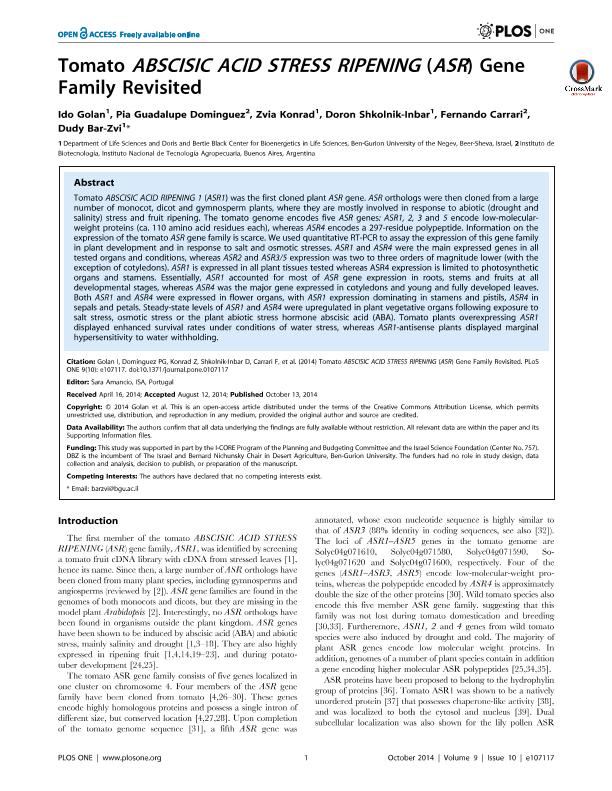Mostrar el registro sencillo del ítem
dc.contributor.author
Golan, Ido
dc.contributor.author
Dominguez, Pia Guadalupe

dc.contributor.author
Konrad, Zvia
dc.contributor.author
Inbar, Moshe

dc.contributor.author
Carrari, Fernando Oscar

dc.contributor.author
Bar-Zvi, Dudy
dc.date.available
2018-01-26T19:01:07Z
dc.date.issued
2014-10
dc.identifier.citation
Golan, Ido; Dominguez, Pia Guadalupe; Konrad, Zvia; Inbar, Moshe; Carrari, Fernando Oscar; et al.; Tomato ABSCISIC ACID STRESS RIPENING (ASR) Gene Family Revisited; Public Library of Science; Plos One; 9; 10; 10-2014; 1-8; e107117
dc.identifier.issn
1932-6203
dc.identifier.uri
http://hdl.handle.net/11336/34740
dc.description.abstract
Tomato ABSCISIC ACID RIPENING 1 (ASR1) was the first cloned plant ASR gene. ASR orthologs were then cloned from a large number of monocot, dicot and gymnosperm plants, where they are mostly involved in response to abiotic (drought and salinity) stress and fruit ripening. The tomato genome encodes five ASR genes: ASR1, 2, 3 and 5 encode low-molecular-weight proteins (ca. 110 amino acid residues each), whereas ASR4 encodes a 297-residue polypeptide. Information on the expression of the tomato ASR gene family is scarce. We used quantitative RT-PCR to assay the expression of this gene family in plant development and in response to salt and osmotic stresses. ASR1 and ASR4 were the main expressed genes in all tested organs and conditions, whereas ASR2 and ASR3/5 expression was two to three orders of magnitude lower (with the exception of cotyledons). ASR1 is expressed in all plant tissues tested whereas ASR4 expression is limited to photosynthetic organs and stamens. Essentially, ASR1 accounted for most of ASR gene expression in roots, stems and fruits at all developmental stages, whereas ASR4 was the major gene expressed in cotyledons and young and fully developed leaves. Both ASR1 and ASR4 were expressed in flower organs, with ASR1 expression dominating in stamens and pistils, ASR4 in sepals and petals. Steady-state levels of ASR1 and ASR4 were upregulated in plant vegetative organs following exposure to salt stress, osmotic stress or the plant abiotic stress hormone abscisic acid (ABA). Tomato plants overexpressing ASR1 displayed enhanced survival rates under conditions of water stress, whereas ASR1-antisense plants displayed marginal hypersensitivity to water withholding.
dc.format
application/pdf
dc.language.iso
eng
dc.publisher
Public Library of Science

dc.rights
info:eu-repo/semantics/openAccess
dc.rights.uri
https://creativecommons.org/licenses/by/2.5/ar/
dc.subject
Tomato
dc.subject
Asr
dc.subject
Ripening
dc.subject
Water Stress
dc.subject.classification
Otras Ciencias Biológicas

dc.subject.classification
Ciencias Biológicas

dc.subject.classification
CIENCIAS NATURALES Y EXACTAS

dc.title
Tomato ABSCISIC ACID STRESS RIPENING (ASR) Gene Family Revisited
dc.type
info:eu-repo/semantics/article
dc.type
info:ar-repo/semantics/artículo
dc.type
info:eu-repo/semantics/publishedVersion
dc.date.updated
2018-01-24T18:58:31Z
dc.journal.volume
9
dc.journal.number
10
dc.journal.pagination
1-8; e107117
dc.journal.pais
Estados Unidos

dc.journal.ciudad
San Francisco
dc.description.fil
Fil: Golan, Ido. Ben Gurion University of the Negev; Israel
dc.description.fil
Fil: Dominguez, Pia Guadalupe. Instituto Nacional de Tecnología Agropecuaria. Centro de Investigación en Ciencias Veterinarias y Agronómicas. Instituto de Biotecnología; Argentina. Consejo Nacional de Investigaciones Científicas y Técnicas; Argentina
dc.description.fil
Fil: Konrad, Zvia. Ben Gurion University of the Negev; Israel
dc.description.fil
Fil: Inbar, Moshe. Ben Gurion University of the Negev; Israel
dc.description.fil
Fil: Carrari, Fernando Oscar. Instituto Nacional de Tecnología Agropecuaria. Centro de Investigación en Ciencias Veterinarias y Agronómicas. Instituto de Biotecnología; Argentina. Consejo Nacional de Investigaciones Científicas y Técnicas; Argentina
dc.description.fil
Fil: Bar-Zvi, Dudy. Ben Gurion University of the Negev; Israel
dc.journal.title
Plos One

dc.relation.alternativeid
info:eu-repo/semantics/altIdentifier/url/http://www.ncbi.nlm.nih.gov/pmc/articles/PMC4195575/pdf/pone.0107117.pdf
dc.relation.alternativeid
info:eu-repo/semantics/altIdentifier/url/http://journals.plos.org/plosone/article?id=10.1371/journal.pone.0107117
dc.relation.alternativeid
info:eu-repo/semantics/altIdentifier/doi/http://dx.doi.org/10.1371/journal.pone.0107117
Archivos asociados
